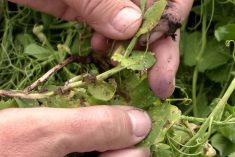 Manitoba could have a new farmer checkoff-funded spring wheat and barley association operating by Jan. 1.
Manitoba could have a new farmer checkoff-funded spring wheat and barley association operating by Jan. 1.
The Agricultural Producers’ Organization Certification Agency has recommended the association, which will focus on wheat and barley research and market promotion, be certified, said Don Dewar, the association’s interim chair and Dauphin-area farmer.
Read Also

Manitoba canola industry has new frontiers
Canola oil is still the main priority for the sector, but canola meal is increasingly the subject of research looking for new markets and uses for the oilseed’s byproduct.
“It would be rare if the government didn’t follow the recommendation of the certification agency,” he said.
Meanwhile, Cereals Canada, a pan-Canadian coalition of provincial and regional cereal associations, life science and grain companies and processors, has been incorporated, said Kent Erickson, one of the association’s interim directors.
Cereals Canada, which will be headquartered in Winnipeg, will focus on enhancing the domestic and international competitiveness of Canadian cereals, said Erickson, a director of the Alberta Wheat Commission and farmer at Irma, Alta.
Manitoba’s new spring cereal association will likely join Cereals Canada, Dewar said.
“It just makes sense to be part of those groups,” Dewar said, adding the association will likely also join the Barley Council of Canada, created in April.
Dewar said he hopes the Manitoba cabinet will soon approve a new regulation under the Agricultural Producers’ Organization Funding Act allowing the spring wheat and barley association to operate with a 52- and 44-cent-a-tonne checkoff on spring wheat and barley, respectively.
“It’s still going to take us two months to get everything in place and start the checkoff,” Dewar said. “We’re aiming for Jan. 1. Hopefully we’re not being too optimistic. It’s quite doable if we have everything done by the end of October or first week of November.”
The new Manitoba wheat and barley checkoffs, along with temporary checkoffs to fund the Western Grains Research Foundation (WGRF), Canadian International Grains Institute (Cigi) and the Brewing and Malting Barley Research Institute (BMBRI), will total $1 a tonne, Dewar said.
An interim seven-member board of directors was set up earlier this year to get the association up and running. Seventy-eight per cent of Manitoba spring wheat and barley growers who responded to a survey said they favoured the new association. It appears that was strong enough support for the certification agency, which could’ve required a referendum first.
Under provincial legislation if more than 30 per cent of farmers accounting for more than 30 per cent of the checkoffs collected in a year request a refund, the certifying agency must hold a referendum among farmers to gauge their support. If a majority vote against continuing the association the agency can recommend to the minister of agriculture that its designation be revoked, ending its checkoff.
The headquarters for the new association has not been determined, Dewar said. In interim an established Manitoba farm commodity group will be asked to operate the new association under contract, at least until its first annual meeting, he said.
Meanwhile, Cereals Canada is working on short-term funding to get established, Erickson said. Membership in the organization, which will be modelled after groups such as Pulse Canada and the Canola Council of Canada, will include three sectors — farmers, life science and seed companies and grain handlers and processors.
“The Canadian Wheat Board did some things before and the industry realizes we need to fill some gaps and that’s what Cereals Canada is trying to do,” Erickson said.
“The way we’ve set it up right now the payers will be the players. As soon as they come on board financially they will have a seat at the table.”
Cereals Canada’s focus will be on wheat, but will also work on oats, rye and triticale, Erickson said. There’s already a national group for barley.
Cereals Canada’s farmer representatives right now come from the Alberta Wheat Commission, and Grain Farmers of Ontario, but it expects to add representatives from Saskatchewan, which has a new wheat commission, Manitoba, British Columbia, Quebec and Atlantic Canada.
Erickson expects in the end it will have a board of 18, with six directors from each sector. Probably four or five of the farm-directors will come from Western Canada, where 95 per cent of cereal production occurs, he said.



















